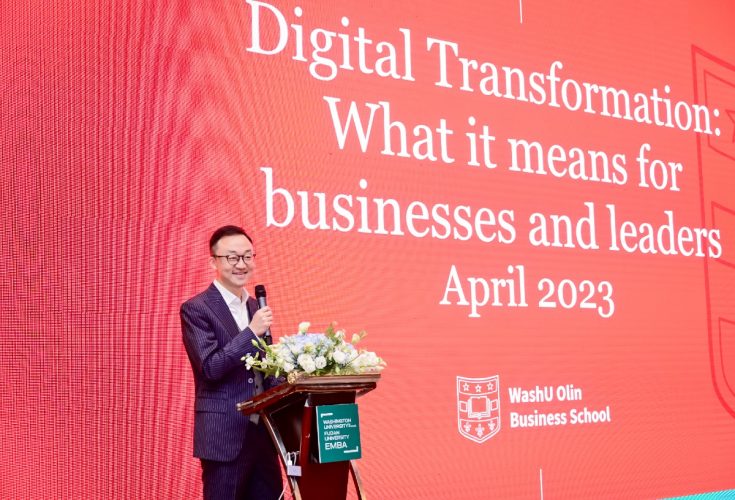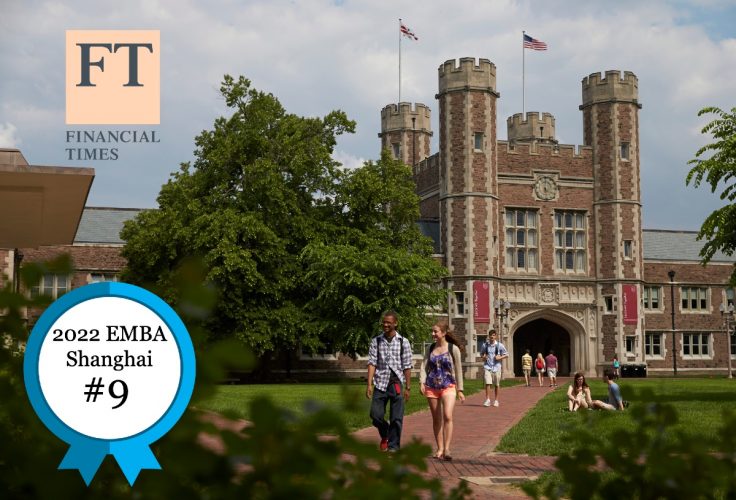In case you’re wondering, yes, that was Paul Shao playing Guns N’ Roses’ “Knockin’ on Heaven’s Door” with his old college rock-and-roll band. They played at the 2018 Chinese New Year party for students in Class 16 of WashU Olin’s Shanghai EMBA program.
That’s just one of the ways Shao, the managing director of the program, engages with students on a personal level. One of many. For example, as a graduate himself in 2013, he knows exactly what the students are going through as they juggle professional, family and corporate lives with a load of coursework.
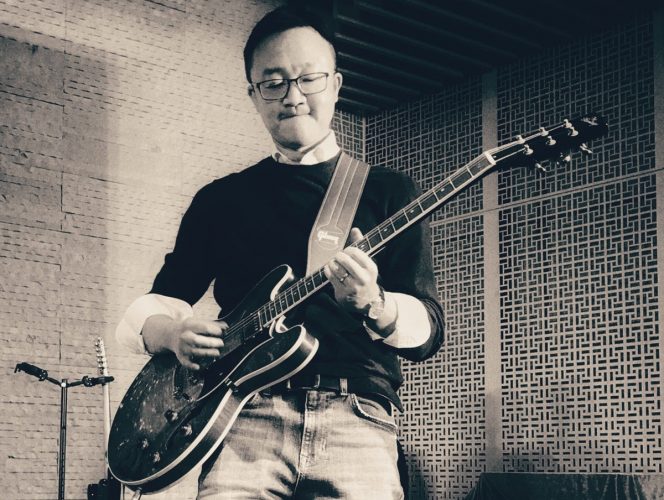
“It would be really hard to overstate the value Paul brings to this program,” said Dan Elfenbein, professor of organization and strategy and associate dean of the 21-year-old EMBA-Shanghai. “In many senses, the program has become a real reflection of who he is and how he thinks.”
In many ways, Shao has a hand in almost every aspect of the program, from coordinating with administrators from Fudan University, WashU Olin’s partner in the program, to marketing the program across China, to screening applicants, to facilitating classroom teamwork, to introducing faculty, to coaching and counseling students.
Applies what he learned in the program to the program
For Shao, the job is about applying what he learned in the program to the program itself: Set your strategy. What is our competitive advantage? How can we win in this market?
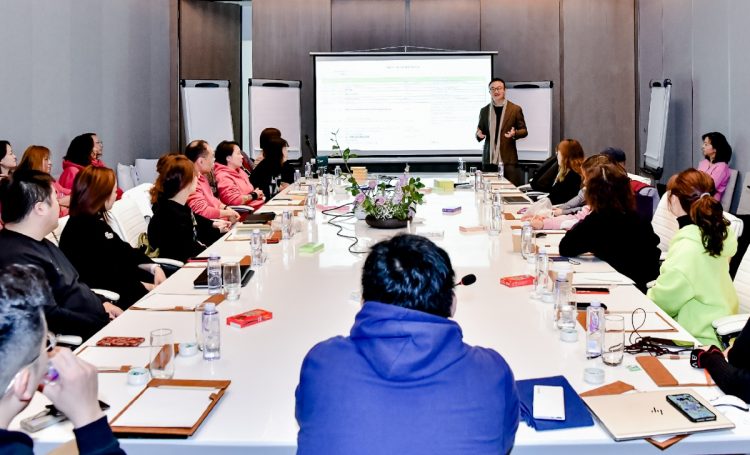
“We have clear positioning here in the market, which is focused on being a top English-language executive MBA program for Chinese business people who are serious about learning, teaching and the experience,” he said. The Shanghai EMBA has consistently been a top-ranked program among its competitors and, two decades ago, was the first American MBA program to be sanctioned by the Chinese Ministry of Education.
“As both alumni and program director, he has a deep understanding of what we need and has been driving changes, adapting to our requests,” said Vincent Wang, EMBA-Shanghai Class 14. He’s now SouthAsia commercial director for Milliken & Company. Wang cites upgrades to the program such as the study abroad portion and its focus on lifelong learning program as benefits Shao had a hand in developing.
Indeed, Shao is heavily involved in launching Class 21, which started on Friday May 26—a class, he’s proud to note, includes at least 50% women for the first time in the program’s history. The class also includes students with remarkable educational backgrounds: nearly half hold master’s degree or PhDs. Meanwhile, 78% serve in director-or-above-level positions and a fifth serve in vice president, general manager or CEO positions. Shao says that bodes well for a productive and meaningful peer-learning experience.
This moment coincides with a milestone for Shao in the program: He’s served as managing director for eight years—a lucky number in Chinese culture that’s associated with prosperity, success and status.
In fact, after six years in the role, Shao also added two more titles: head of executive education at Fudan and head of the joint doctor of business administration program between Fudan and City University of Hong Kong.
A transformational experience
Shao prefers to push aside any focus on success or status for himself, however, preferring to highlight the transformative nature of the program.
“Looking back, what is so important about what’s happened is how people have changed after the program,” he said. “That’s one thing I really like about this program. It really changes people’s lives in a very tangible kind of way.”
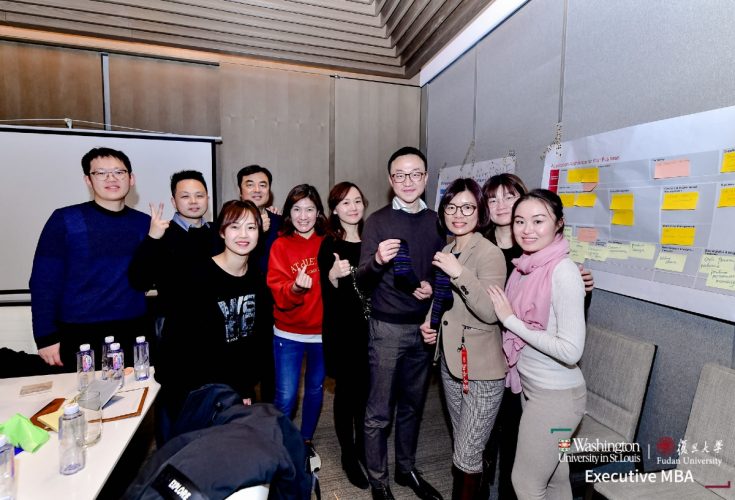
Jolin Liu graduated in Class 16 and now serves as deputy general manager for marketing agency MRM. “I can attest to the value and impact that it has had on my career,” she said. “Since graduating, I have gone on to have a rewarding career in the advertising field, and I credit much of my progress to the skills and knowledge I acquired during my time at WashU Olin.”
She also credits Shao directly, whom she said “encouraged us to push ourselves to new heights, both personally and professionally.”
So does Peiling Lu from Class 17, who now works as a trainer under contract with a German company on ESG-related topics in Taiwan. “He is very caring for all the students—even introverted people like me,” Lu said. “Paul plays a critical role in the program.”
‘Resilience and loyalty’
Never was that more clear than during the pandemic, when national borders slammed shut, cities went on lockdown, and Olin professors could not, of course, teach classes in Shanghai. The global crisis affected three classes, which had to make do with courses taught remotely by Olin professors who would lead classes in the middle of the night St. Louis time.
“I could clearly feel his pressure and motivation,” said Hong Guan, who met with Shao, his Shanghai EMBA classmate, several times during the pandemic. “But stronger was his resilience and loyalty to this program, which maintained it in such an era. He dared to face those abnormal challenges and take responsibility as a leader.” Guan now works for Novartis as TA head of cardiovascular and head of innovative patient activation.
Elfenbein heaps praise on Shao for his dedication to navigating the crisis. He upgraded classroom technology at Fudan University so students could convene in person while professors taught from their homes in the States. He created an engaging experience for students. He collaborated with faculty to accommodate their teaching schedules.
“There was just an incredible amount of adjustment that had to happen,” Elfenbein said. And in retrospect, he said, “we got teaching ratings that were as good as they normally get when they teach in person. I was really, really incredibly happy to see that.”
Elfenbein also appreciates the ease with which Shao navigates cultural differences between China and the United States. It’s a knack program alumni notice as well—and not only the ones who heard Shao shred his guitar at that 2018 party. It turns out he’s quite the student of jazz, favoring Thelonius Monk, Duke Ellington and, of course, St. Louis-regional native Miles Davis.
“His knowledge and enthusiasm for jazz was infectious,” Liu said. “Seeing how he incorporates his passion into his busy schedule helped me understand the importance of finding ways to pursue personal interests outside of work.”
Pictured at top: Paul Shao, managing director of Olin’s joint Shanghai EMBA program with Fudan University, presenting the program to students.


